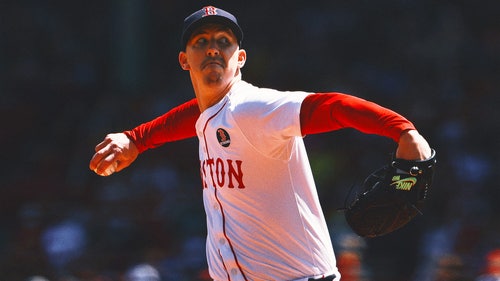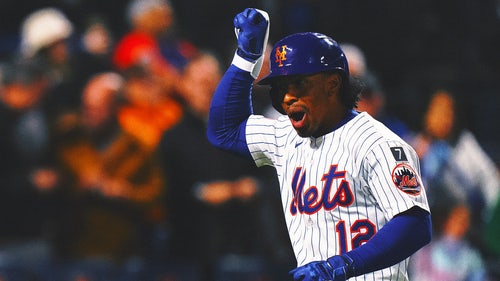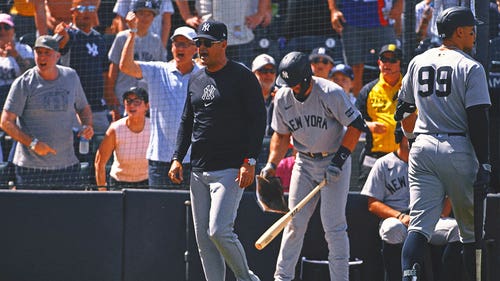
Ryan rewarded for trusting Washington
The Texas Rangers aren’t up 2-0 on the Rays — who’ve managed one run in the last 18 innings — because of good managing. Just the same, it’s impossible to think they’d have finally gotten to this point — a single win from the first victorious playoff series in franchise history — without it.
It’s been an improbable season for Texas, what with the team beginning the year in bankruptcy court and the news in spring training that the 58-year-old manager had tested positive for cocaine.
You don’t hear of many 58-year-olds doing cocaine. As it’s highly habit forming, a lot of users don’t make it to 58. Also, it’s a little like bungee-jumping, not the kind of thing you suddenly pick up late in life. Still, that’s what Ron Washington, manager of the Texas Rangers, would have his bosses believe: the first and only time he ever did the drug was the time he tested positive, shortly after the 2009 All-Star break, back when he was a mere 57.
“Totally shocked,” recalled Nolan Ryan, team president, and more recently, part-owner. “Never even crossed my mind.”
Ryan pitched from 1966 to 1993, but apparently remained oblivious to large chunks of the hallucinogenic '60s and the white lines '80s. “Drugs were never an issue in my life,” he told a Texas radio station shortly after the Washington story broke last March. “I never tried them. I didn’t want anything to do with them.”
That said, he’s made one of the wiser decisions a baseball executive ever made with regard to illicit substances.
It’s worth noting that the history of Major League Baseball and drugs — both performance-enhancing, and that euphemistically named category, “recreational” — is typically fraught with under-reaction, over-reaction and, almost always, rank hypocrisy.
Like steroids, cocaine use was winked at for years, then quite suddenly, declared taboo and prosecutable as a baseball crime. Cocaine might’ve been, as Keith Hernandez famously testified in 1985, “the devil on this earth.” But it was still considered acceptable for ballplayers to do speed and drink like Billy Martin.
Washington, who played until 1989, remembers full well. Perhaps that’s why he summoned his bosses — Ryan and his then-32 year-old general manager, Jon Daniels — and tearfully offered to resign. It was the right thing to do, and as it turned out, the smart thing, too.
Less easily reckoned was Ryan’s response. The Hall of Famer certainly wasn’t partial to druggies, real or accused. What’s more, keeping Washington would pose grave risks. It didn’t matter how much goodwill Ryan had in Texas. A man trying to take a team out of bankruptcy court can’t afford a misstep as public as staying with a manager with a drug problem. At some level, perception is reality; the manager who tests positive is seen as a manager with a drug problem. Ryan had been in the game long enough to figure that someone would eventually rat his guy out, which of course, someone did.
If Ryan admired the honesty and courage of Washington’s confession, he also knew he’d been betrayed.
“Yeah, you feel some of that,” he said. “Took us three days before we made the decision. “We tried to get a handle on our emotions and investigate the situation, and to see to what degree Wash had a problem.”
Ryan likes to say “the organization believes in giving second chances” — the most notable of them going to Josh Hamilton, a recovering addict who blew a dozen or so before surfacing with the Rangers in ’08. But Hamilton was a player. This was different. This was a manager.
“He was improving every year,” said Ryan. “We were seeing the progress we wanted to see. Guys played for him.”
The decision was made not to fire Washington. He was good with young players, like Hamilton and Ian Kinsler. But veterans like Michael Young also swore by him. As it happened, Young was the first to speak on his manager’s behalf during a team meeting in March when the story broke.
“I got your back,” he said.
And apparently, the manager had theirs. Now no one can say for sure that Washington didn’t have a drug problem. But it’s safe to say he doesn’t now. He’s tested several times a week. But more than that, he doesn’t manage a team to 90 wins with a cocaine addiction.
In Washington’s four years as skipper, Texas has gone from 75 wins to 79 to 87 and now, 90. This season has seen the emergence of young players like Elvis Andrus and the rejuvenation of older ones, like Vladimir Guerrero. The manager had something to do with that. The question is, would they be here without him?
“It’s really hard to speculate on that,” said Ryan. “Whoever you brought in would’ve had to have been a fit for the club we had. The relationships would’ve had to developed.”
In other words, probably not.
“I do believe we did the right thing,” said Nolan Ryan.
The smart thing, too.





